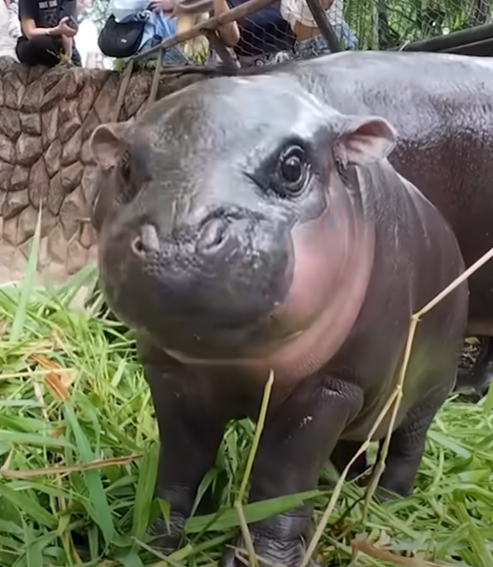Meet Moo Deng, the baby pygmy hippo
A baby pygmy hippopotamus at a zoo in Thailand has quickly gained worldwide attention after the zoo started sharing videos of her online. However, the increased popularity has led to some concerning behavior from visitors, according to zoo officials.
View this post on Instagram
The two-month-old hippo, named Moo Deng, has become a social media sensation. Her adorable photos and videos have been widely shared, including a post from the Utah Jazz that featured her in celebration of the team’s home-opening game. Sephora Thailand also joined the fun, sharing a post about how to “wear your blush like a baby hippo,” inspired by Moo Deng’s rosy cheeks.
Moo Deng’s fame has attracted more visitors to the Khao Kheow Open Zoo in Chonburi, Thailand. Unfortunately, some visitors have misbehaved, prompting the zoo to limit her viewing times. Zoo officials reported that some people have been pouring water on Moo Deng and throwing objects at her. As a result, the zoo now allows visitors to see her for only five minutes on Saturdays and Sundays.
Narongwit Chodchoi, the zoo’s director, issued a warning last week, stating that there would be legal consequences for anyone harassing the young hippo. “These behaviors are not only cruel but also dangerous,” he said, according to the Nation Thailand. “We must protect these animals and ensure they have a safe and comfortable environment.”
Moo Deng, whose name means “bouncy pig,” was born on July 10 to her mother, Jona, and father, Tony. She is the seventh baby hippo born to the couple at the zoo. The name was chosen by over 20,000 people through an online vote and announced in late August.
Videos of Moo Deng have been widely shared on a TikTok page dedicated to the zoo’s animals, which has over 2.7 million followers. The videos have also gone viral on Instagram, with hippo fan pages sharing clips of the playful baby.
The pygmy hippopotamus is an endangered species, with an estimated 2,000-2,500 mature individuals remaining in the wild as of 2015, according to the IUCN Red List of Threatened Species. Their population is declining due to hunting and habitat destruction. These smaller cousins of the common hippopotamus are native to West Africa, primarily found in countries like Liberia, Sierra Leone, Guinea, and Ivory Coast.

